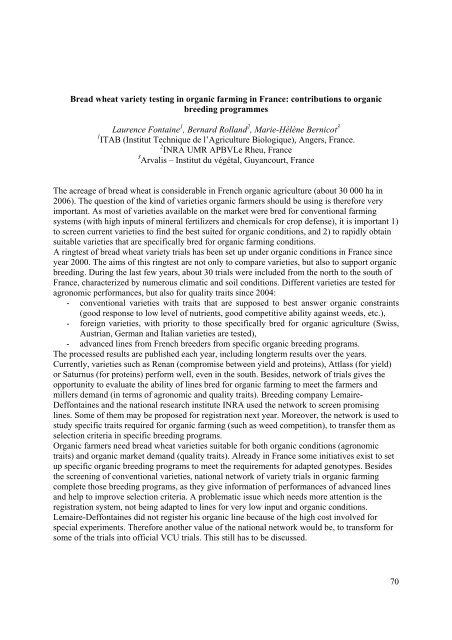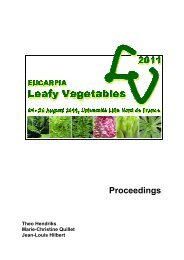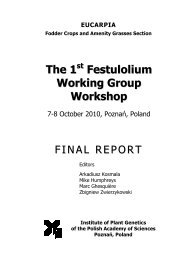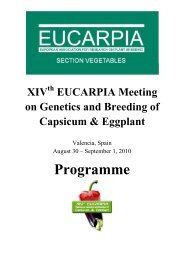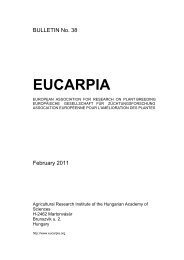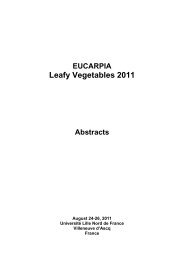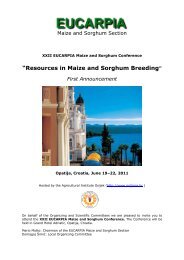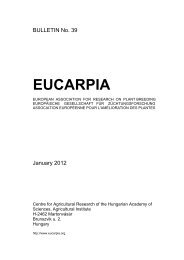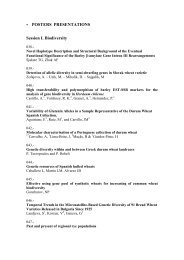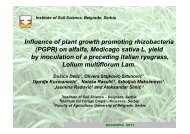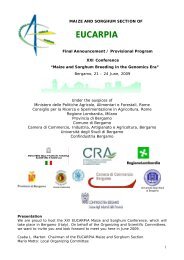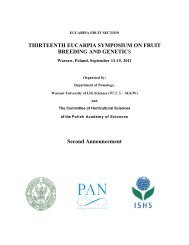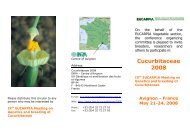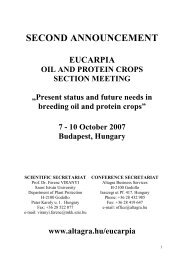Plant breeding for organic and sustainable, low-input agriculture
Plant breeding for organic and sustainable, low-input agriculture
Plant breeding for organic and sustainable, low-input agriculture
You also want an ePaper? Increase the reach of your titles
YUMPU automatically turns print PDFs into web optimized ePapers that Google loves.
Bread wheat variety testing in <strong>organic</strong> farming in France: contributions to <strong>organic</strong><br />
<strong>breeding</strong> programmes<br />
Laurence Fontaine 1 , Bernard Roll<strong>and</strong> 2 , Marie-Hélène Bernicot 3<br />
1 ITAB (Institut Technique de l’Agriculture Biologique), Angers, France.<br />
2 INRA UMR APBVLe Rheu, France<br />
3 Arvalis – Institut du végétal, Guyancourt, France<br />
The acreage of bread wheat is considerable in French <strong>organic</strong> <strong>agriculture</strong> (about 30 000 ha in<br />
2006). The question of the kind of varieties <strong>organic</strong> farmers should be using is there<strong>for</strong>e very<br />
important. As most of varieties available on the market were bred <strong>for</strong> conventional farming<br />
systems (with high <strong>input</strong>s of mineral fertilizers <strong>and</strong> chemicals <strong>for</strong> crop defense), it is important 1)<br />
to screen current varieties to find the best suited <strong>for</strong> <strong>organic</strong> conditions, <strong>and</strong> 2) to rapidly obtain<br />
suitable varieties that are specifically bred <strong>for</strong> <strong>organic</strong> farming conditions.<br />
A ringtest of bread wheat variety trials has been set up under <strong>organic</strong> conditions in France since<br />
year 2000. The aims of this ringtest are not only to compare varieties, but also to support <strong>organic</strong><br />
<strong>breeding</strong>. During the last few years, about 30 trials were included from the north to the south of<br />
France, characterized by numerous climatic <strong>and</strong> soil conditions. Different varieties are tested <strong>for</strong><br />
agronomic per<strong>for</strong>mances, but also <strong>for</strong> quality traits since 2004:<br />
- conventional varieties with traits that are supposed to best answer <strong>organic</strong> constraints<br />
(good response to <strong>low</strong> level of nutrients, good competitive ability against weeds, etc.),<br />
- <strong>for</strong>eign varieties, with priority to those specifically bred <strong>for</strong> <strong>organic</strong> <strong>agriculture</strong> (Swiss,<br />
Austrian, German <strong>and</strong> Italian varieties are tested),<br />
- advanced lines from French breeders from specific <strong>organic</strong> <strong>breeding</strong> programs.<br />
The processed results are published each year, including longterm results over the years.<br />
Currently, varieties such as Renan (compromise between yield <strong>and</strong> proteins), Attlass (<strong>for</strong> yield)<br />
or Saturnus (<strong>for</strong> proteins) per<strong>for</strong>m well, even in the south. Besides, network of trials gives the<br />
opportunity to evaluate the ability of lines bred <strong>for</strong> <strong>organic</strong> farming to meet the farmers <strong>and</strong><br />
millers dem<strong>and</strong> (in terms of agronomic <strong>and</strong> quality traits). Breeding company Lemaire-<br />
Deffontaines <strong>and</strong> the national research institute INRA used the network to screen promising<br />
lines. Some of them may be proposed <strong>for</strong> registration next year. Moreover, the network is used to<br />
study specific traits required <strong>for</strong> <strong>organic</strong> farming (such as weed competition), to transfer them as<br />
selection criteria in specific <strong>breeding</strong> programs.<br />
Organic farmers need bread wheat varieties suitable <strong>for</strong> both <strong>organic</strong> conditions (agronomic<br />
traits) <strong>and</strong> <strong>organic</strong> market dem<strong>and</strong> (quality traits). Already in France some initiatives exist to set<br />
up specific <strong>organic</strong> <strong>breeding</strong> programs to meet the requirements <strong>for</strong> adapted genotypes. Besides<br />
the screening of conventional varieties, national network of variety trials in <strong>organic</strong> farming<br />
complete those <strong>breeding</strong> programs, as they give in<strong>for</strong>mation of per<strong>for</strong>mances of advanced lines<br />
<strong>and</strong> help to improve selection criteria. A problematic issue which needs more attention is the<br />
registration system, not being adapted to lines <strong>for</strong> very <strong>low</strong> <strong>input</strong> <strong>and</strong> <strong>organic</strong> conditions.<br />
Lemaire-Deffontaines did not register his <strong>organic</strong> line because of the high cost involved <strong>for</strong><br />
special experiments. There<strong>for</strong>e another value of the national network would be, to trans<strong>for</strong>m <strong>for</strong><br />
some of the trials into official VCU trials. This still has to be discussed.<br />
70


